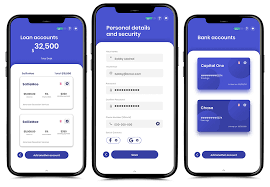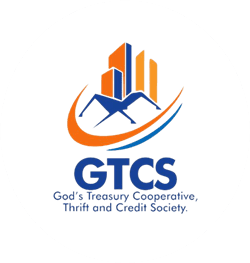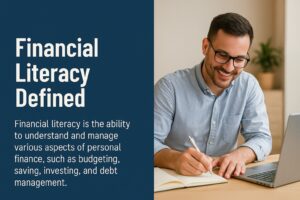Introduction
In today’s rapidly evolving economy, where financial decisions are more complex than ever, financial literacy has emerged as a foundational skill for navigating everyday life. Whether managing debt, planning for retirement, or understanding digital financial tools, the ability to make informed choices about money impacts individuals, families, and entire economies. As access to credit, investment platforms, and fintech apps grows, so too does the need for education that empowers people to use these tools wisely. Financial literacy isn’t just about knowing how to budget; it’s about creating stability, security, and opportunity in a world full of financial uncertainty.
Core Concepts of Financial Literacy
At the heart of financial literacy lies a set of core concepts that shape how individuals manage their money, plan for the future, and respond to financial challenges. These foundational skills include budgeting, saving, investing, debt management, understanding interest, and inflation awareness. Together, they equip people to make smart, informed decisions that support long-term stability and financial well-being.
Budgeting: The Blueprint of Financial Success
Budgeting is the first and most critical step in personal finance. It’s the process of creating a plan to spend your money wisely by tracking income and expenses. A well-crafted budget ensures that your needs are met, savings goals are achieved, and unnecessary spending is minimized. It’s not just about restrictions; budgeting actually gives you the freedom to spend confidently, knowing you’re in control.
Key Benefits of Budgeting:
- Avoids overspending
- Helps achieve short- and long-term goals
- Identifies spending patterns
- Builds discipline and awareness
Saving: Securing the Present and Future
Saving is more than setting money aside; it’s about preparing for emergencies, opportunities, and long-term goals. Whether you’re building an emergency fund or saving for a vacation or a home, having liquid cash available reduces stress and keeps you financially agile.
Types of Savings:
- Emergency Fund: Covers 3–6 months of living expenses
- Short-Term Savings: For travel, gifts, or gadgets
- Long-Term Savings: For education, down payments, or major investments
Investing: Growing Wealth Over Time
While saving keeps your money safe, investing grows it. Investing involves putting money into assets like stocks, bonds, or mutual funds with the expectation of earning returns. Though it comes with risks, informed investing can significantly increase your wealth over time and is essential for retirement planning.
Principles of Smart Investing:
- Diversify your portfolio
- Invest consistently over time
- Understand risk vs. reward
- Start early to benefit from compound growth
Debt Management: Staying in Control
Not all debt is bad. Some, like mortgages or student loans, can be strategic. However, managing debt responsibly is crucial. This means knowing your obligations, paying on time, avoiding high-interest debt, and understanding the true cost of borrowing.
Debt Management Tips:
- Pay more than the minimum when possible
- Avoid payday loans and high-interest credit cards
- Use debt consolidation if needed
- Monitor your credit report regularly
Understanding Interest: The Double-Edged Sword

Interest can work for you or against you. When saving or investing, compound interest grows your wealth. But with borrowing, especially on high-interest credit cards or loans, it can snowball into unmanageable debt.
Simple vs. Compound Interest:
- Simple Interest: Based on the original amount
- Compound Interest: Earns interest on both the principal and previously earned interest
Knowing how interest works empowers individuals to make better borrowing and investing choices.
Inflation Awareness: Protecting Your Purchasing Power
Inflation gradually reduces the value of money, making goods and services more expensive over time. While it’s a normal part of economic growth, unchecked inflation can erode savings. Financially literate individuals invest in assets that outpace inflation, ensuring their money maintains its buying power.
Ways to Combat Inflation:
- Invest in real assets (like property)
- Consider inflation-protected securities
- Avoid hoarding cash in low-interest accounts
The Economic Impact of Financial Knowledge
Financial literacy does more than help individuals balance their budget. It plays a significant role in shaping the economic health of entire nations. When citizens are financially informed, they make better decisions that ripple throughout society, supporting economic resilience, lowering debt burdens, and reducing reliance on government welfare systems. Let’s explore how financial literacy contributes to the strength and stability of both individuals and national economies.
1. Financial Literacy Promotes Economic Resilience
A financially literate population is better prepared to weather economic shocks. Whether it’s a job loss, a medical emergency, or a global crisis like the COVID-19 pandemic, individuals with financial knowledge are more likely to have emergency savings, understand how to access credit responsibly, and avoid panic-driven financial decisions.
When people can manage through hard times without defaulting on loans or draining social safety nets, it stabilizes local economies. On a macro level, this stability helps maintain consumer confidence and consistent economic activity, even during downturns.
2. Reduces National Debt Levels
One of the lesser-known benefits of widespread financial literacy is its influence on national debt. Poor financial habits among citizens often lead to high default rates on student loans, credit cards, and mortgages, which can ultimately affect financial institutions and require government intervention.
When individuals understand how interest accumulates, how to budget for debt repayment, and how to prioritize essential expenses, they are less likely to borrow irresponsibly or fall into long-term debt traps. Over time, this responsible behavior reduces the need for government bailouts, subsidies, or emergency support programs funded by national debt.
3. Lessens Dependency on Welfare Systems
A financially capable society also eases the burden on public welfare systems. Citizens who manage their income effectively are more likely to sustain themselves during hard times without turning to unemployment benefits, housing assistance, or food stamps.
This shift doesn’t just save government resources; it allows those programs to better serve the most vulnerable populations. By empowering more people to take control of their financial futures, financial literacy fosters independence, dignity, and self-reliance, reducing the long-term costs of poverty and unemployment.
Challenges and Consequences of Financial Illiteracy
Financial illiteracy is more than just a lack of knowledge. It’s a widespread issue with deep-rooted effects on both individuals and society at large. In an economy that increasingly demands self-reliance in financial planning, not understanding basic money concepts can lead to lasting consequences. From personal debt spirals to broader economic instability, the fallout of financial illiteracy affects everyone.
Debt Crises: The Personal and National Struggle
One of the most immediate and visible effects of financial illiteracy is the mismanagement of debt. Individuals who lack understanding of interest rates, credit terms, or repayment strategies often fall into debt traps. This is especially true with high-interest loans such as credit cards, payday advances, and buy-now-pay-later schemes.
Globally, millions of people are burdened with consumer debt simply because they weren’t educated on how to manage credit responsibly. They may only pay the minimum on their credit cards or take out new loans to pay off old ones, leading to compounding interest and long-term financial strain. When large numbers of citizens face such debt, the broader economy suffers too; loan defaults rise, credit markets tighten, and economic growth slows.
Inadequate Retirement Planning
Another major consequence is insufficient retirement savings. Many people underestimate how much money they will need after they stop working. Financially illiterate individuals may not understand the power of compound interest or the importance of starting to save early. This leads to reliance on limited government pensions or social support, which may not cover the rising costs of living, healthcare, and longevity.
In countries without strong social safety nets, this issue becomes even more serious. A population that cannot financially support itself in old age puts pressure on public resources and may face higher poverty rates among the elderly.
Vulnerability to Scams and Fraud

People who don’t understand basic financial principles are also more vulnerable to fraud, scams, and predatory financial products. They may fall for phishing emails, fake investment opportunities, or dishonest financial advisors. In today’s digital age, scams are more sophisticated and convincing, often preying on those who lack financial awareness.
Older adults are particularly at risk, as they may not be as tech-savvy and are often targeted for identity theft, reverse mortgage fraud, or bogus retirement investments. Unfortunately, once the damage is done, recovery is difficult and sometimes impossible, leading to emotional distress, loss of trust, and long-term financial ruin.
Ripple Effects on Society
When large portions of a population are financially illiterate, the effects go beyond individual hardship. Societal consequences include higher healthcare costs due to stress-related illnesses, reduced productivity, increased reliance on social assistance programs, and lower rates of home ownership or small business development.
Moreover, financial illiteracy hinders economic growth. People who don’t understand how to invest or manage finances are less likely to contribute to entrepreneurial activities or long-term investments, both of which are vital for a thriving economy.
Financial Education Across Life Stages
Financial literacy isn’t a one-size-fits-all skill. It evolves with us throughout life. From a child’s first piggy bank to a senior managing retirement funds, tailored financial education plays a vital role in promoting healthy financial habits at every stage. Here’s a look at why financial literacy needs to be personalized for each life phase and how it shapes confident, capable money managers across generations.
Why Tailored Financial Education Matters
Financial decisions change as we grow. Children need to learn the basics of saving and spending, while adults grapple with credit, loans, and investments. Meanwhile, seniors face unique challenges like managing pensions, healthcare costs, and estate planning. When financial education is customized to the life stage, it becomes more relevant, effective, and empowering.
Let’s explore how financial education looks different—and equally important—across various age groups:
1. Children (Ages 5-12): Building a Foundation
At this young age, kids are naturally curious and absorb lessons quickly. Early financial education can be introduced through playful yet meaningful activities like:
- Using piggy banks to teach saving
- Allowing them to make small purchase decisions with allowance
- Introducing simple concepts like “needs vs. wants”
These foundational habits shape their understanding of money’s value and encourage responsible behavior.
2. Teens (Ages 13-19): Learning Real-World Applications
Teenagers start to interact more with the financial world, earning part-time income, saving for goals, or even managing their own bank accounts. Key areas of focus should include:
- Budgeting basics and saving strategies
- Understanding credit and debit cards
- Introduction to compound interest
- Risks of debt and importance of credit scores
Hands-on experiences like simulated stock market games or creating personal budgets can make these lessons stick.
3. Adults (Ages 20-60): Navigating Major Life Milestones
This is the most financially dynamic phase of life. College loans, home purchases, career changes, raising children, and planning for retirement. Tailored education should address:
- Debt management and credit building
- Investing in 401(k)s, IRAs, and other retirement plans
- Managing household budgets and financial planning
- Insurance and tax strategies
Real-life tools like mobile budgeting apps, financial advisors, and workshops can enhance practical application.
4. Seniors (60+): Preserving Wealth and Legacy
For seniors, financial literacy revolves around protection, preservation, and planning. Critical topics include:
- Understanding Medicare, long-term care, and health insurance
- Avoiding financial scams and fraud
- Drawing down retirement savings efficiently
- Estate planning and wills
Workshops and community outreach programs tailored for seniors can help prevent common financial pitfalls in this stage.
Modern Tools and Methods for Financial Learning
In today’s fast-paced and complex economy, understanding money management is more crucial than ever. With the rise of digital technology and changing economic landscapes, traditional methods of financial education have evolved. Now, modern tools and platforms are stepping in to fill the gap, empowering individuals across all age groups to gain essential financial skills in engaging, accessible ways. Let’s explore how schools, workplaces, government initiatives, fintech apps, and online platforms play pivotal roles in delivering financial education in the modern world.
Schools: Building Financial Foundations Early
Educational institutions are increasingly embedding financial literacy into school curriculums. From interactive classroom sessions to gamified apps and virtual simulations, students are learning about budgeting, saving, investing, and the importance of credit from a young age.
- Elementary to high school programs often include real-life budgeting exercises.
- College-level courses now offer in-depth modules on personal finance, student loans, and debt management.
- Many schools also partner with banks or financial institutions to host financial literacy weeks or seminars.
This early exposure helps students become confident in managing their money before entering adulthood.
Workplaces: Promoting Financial Wellness for Employees
Many employers are now recognizing that financially literate employees are more productive and less stressed. As a result, they’re offering workplace financial wellness programs that include:
- Workshops and seminars on budgeting, investing, and retirement planning.
- One-on-one financial counseling as part of employee assistance programs.
- Access to financial planning tools like salary budgeting apps or 401(k) calculators.
These initiatives not only improve employees’ financial health but also enhance overall job satisfaction and loyalty.
Government Initiatives: Driving Nationwide Financial Education
Governments worldwide are investing heavily in promoting financial literacy at a national level. Their initiatives aim to bridge the knowledge gap across various demographics, including underserved communities. Examples include:
- Public service campaigns about saving and credit.
- National financial literacy strategies developed by departments of education and finance.
- Free online courses and toolkits offered via official government websites.
In the U.S., for instance, the Financial Literacy and Education Commission (FLEC) coordinates efforts across federal agencies to deliver consistent and accessible financial education.
Fintech Apps: Learning Through Everyday Transactions

Financial technology (fintech) apps have revolutionized the way people learn about and manage money. These apps make financial education:
- Interactive and personalized—users receive insights based on their spending habits.
- Gamified—earning badges, leveling up, or completing money-saving challenges.
- Accessible 24/7—making it easy for users to learn anytime, anywhere.
Popular apps like Mint, YNAB (You Need a Budget), and Robinhood not only help users manage finances but also offer educational content on budgeting, investing, and saving strategies.
Online Platforms: Expanding Access to Financial Knowledge
The internet is a goldmine of financial literacy resources. From YouTube channels and podcasts to MOOCs (Massive Open Online Courses), online platforms cater to all learning styles and paces.
- YouTube channels like The Financial Diet or Graham Stephan break down complex topics.
- Podcasts such as “Planet Money” and “HerMoney” provide on-the-go learning.
- Free courses on platforms like Coursera and Khan Academy cover topics from budgeting basics to advanced investing.
These resources are especially beneficial for self-learners who prefer studying at their own pace.
Conclusion
Money touches every part of our lives. Yet, most of us were never taught how to manage it properly. That’s why financial literacy isn’t just important; it’s empowering.
To build a financially literate society, we need to start where we are. Whether you’re a student, a parent, or a professional, taking even small steps like tracking your expenses or understanding interest rates can make a big difference. Over time, those little efforts compound into lasting financial confidence.
Education is key. Encourage conversations about money in your family. Seek out resources; there’s no shame in learning as you go.
Use what’s available to you. Leverage fintech tools, attend workshops, or watch a quick 10-minute video on budgeting during your lunch break. Small, consistent learning wins the race.
Here’s your golden opportunity; don’t walk this journey alone. Discover God’s Treasury Cooperative, your go-to hub for transforming your financial story! They offer smart business ideas, practical savings and investment plans, and strategic business growth blueprints tailored for everyday people just like you. Whether you’re dreaming of launching a side hustle or growing your enterprise, they’ve got the tools and guidance to make it happen.
Don’t wait for “the right time.” The best time to take charge of your financial future is now. Let’s raise a generation that doesn’t fear finances but masters them with purpose and passion.


